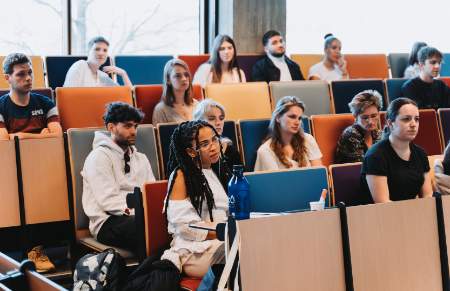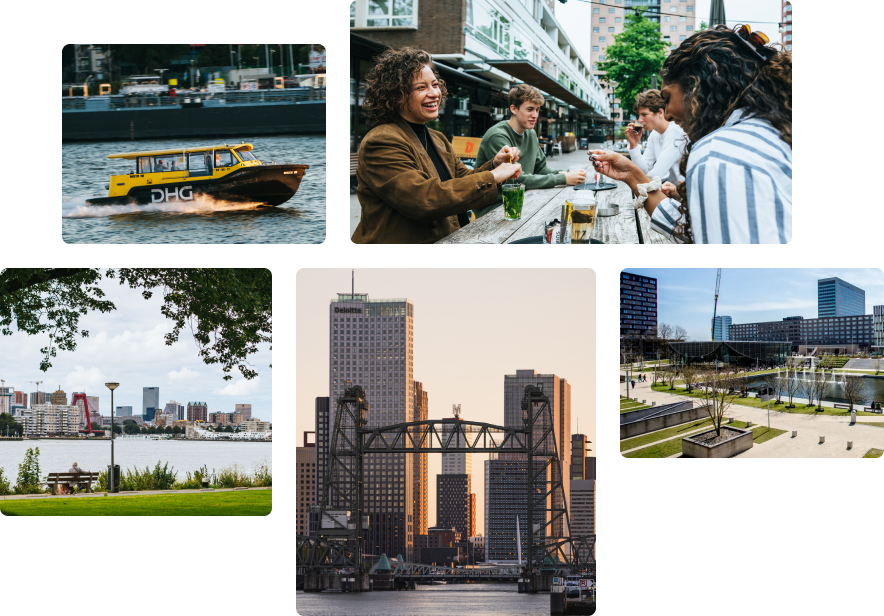Is this the programme you're looking for?
The International Master’s in Advanced Research in Criminology (IMARC) is a 120 ECTS study Programme for graduate students with a background in Criminology or other social science. The programme is designed to respond critically, scientifically and in a policy-oriented manner to social questions that have changed the nature of crime, harm and control, as well as the agendas of researchers and practitioners within these fields.
The International Master’s in Advanced Research in Criminology (IMARC) is a 2-year full-time international postgraduate higher education programme in research-oriented criminology with a focus on border crossing, security and social justice. The need for IMARC follows from the ways in which globalisation, information and knowledge flows change crime and crime control and from continuous efforts of the EU to build a common criminal justice area within its external borders. Large-scale regular and irregular migration and geopolitical conflicts invite new questions that involve national and international actors and require joint international approaches to current European and worldwide developments. IMARC addresses the need for highly qualified, interdisciplinary and internationally oriented criminologists that can offer original and relevant analyses and develop innovative, effective and ethical solutions to advance academic research, policy and practice.
IMARC is the first criminology programme that prepares students to engage with border crossing, security and social justice from a truly European and global perspective. The programme brings together learning, research and practice through collaboration with well-established partners, which include universities, government agencies, public authorities, non-governmental organisations, and private enterprises. IMARC fosters cooperation and dialogue with organisations and civil society, which strengthens academic and societal relevance of the programme and facilitates the development of transversal skills, thus contributing to the employability and citizenship skills of our students.
The IMARC consortium enables student and staff mobility and allows postgraduates to undertake multi-sited and comparative research. IMARC is a two-year master’s programme offered by four partner universities: Erasmus University Rotterdam, Ghent University, University of Malaga and Middlesex University Rotterdam.
Practical information
- Type
- Master
- Degree
- MSc
- Mode of study
- Full-time
- Instruction language
- English
- Duration
- 2 years
- Study points (EC)
- 120
- Location
- Campus Woudestein
- Start date
- September
- Application Deadline (EEA)
- 30 June
The study programme in a nutshell
We offer:
- Critical theoretical and practical perspectives on border-crossing, security and social justice.
- Qualitative and quantitative criminological research skills. One year is allocated in the curriculum for conducting research. In this way, the program meets the research ambitions of excellent students who want to grow into research positions.
- Engagement in research and being open minded to reflect and respond to new developments and current discussions in criminology and the work field of borders, security and social justice.
- The programme brings together learning, research and practice through collaboration with already well-established partners among which governments, ngo’s, corporate actors and other Universities, which contributes to the employability of our students.
- Participation in international conferences, twice a year with students form other universities (Common Sessions).
- You will have the possibility to attend a joint master programme devoting special attention to research mobility and intercultural exchange.
- Upon successful completion of the Joint Master’s Programme, you will be awarded with a double degree: the national degree of the university you spent at least one semester.
What you will learn
You will learn:
- to combine academic expertise and research in order to tackle complex issues from a European and global perspective. This allows you to contribute effectively to the protection of human rights. Students gain a well-founded understanding of border issues, social justice and security.
- about border issues with special attention to migration. Points of view from different disciplines (legal, political, cultural and sociological approaches) are combined. The concept of social justice draws from legal, sociological, and political research traditions and includes concerns that may overlap and interact.
- transversal skills such as creativity, entrepreneurship, problem-solving attitude, reflective thinking and perseverance. Through program mobility, organising social events and reflective meetings about differences in learning methods, you develop cultural sensitivity to ethics, cross-cultural differences and integrity. Skills related to leadership, communication and cooperation are included in the IMARC curriculum.
Is this the right programme for you?
Are you looking for:
- a research-oriented programme? One year (2nd year) is allocated for conducting research and writing your thesis. During the first year you follow taught modules.
- an interdisciplinary criminology programme that is distinctive from related offerings on the themes of border crossing, migration, human rights and social justice?
- a critical-reflexive approach to these themes?
- mobility in your master programme? The compulsory mobility promotes employability and personal development.
- building a network during your programme? IMARC has an international collaboration with international universities and organisations (associate partners and network partners).
- gaining a new experience in an informal setting with a group of international fellow students? An important part of IMARC is the Common Study Program in Critical Criminology (CSP), a 40-year collaboration with 16 international universities. Twice a year, students and staff come together in one of the university centers for a 'Common Session'. The CSP offers students the opportunity to participate in a series of structured and informal sessions.
Want to know more? Meet us here

Career opportunities after graduation
- The geopolitical changes show that there are more and more organisations involved in combating or preventing migration, security, crime and social justice.
- Alumni can work in a variety of industries at different levels in analytical roles, policy-making roles, research roles or PhD positions.
- Potential employers are inter- and non-governmental organisations, national and European government departments, consultancy firms, research and academic institutions, banks and insurance companies and consultancies.
- IMARC alumni work at international organisations in the Netherlands, EU organisations or national organisations in other countries. The analysis, policy or research roles are fulfilled in both (semi-)government organisations and in the private sector, where they often work in positions to understand and explain international trends in the field of migration and social exclusion.


